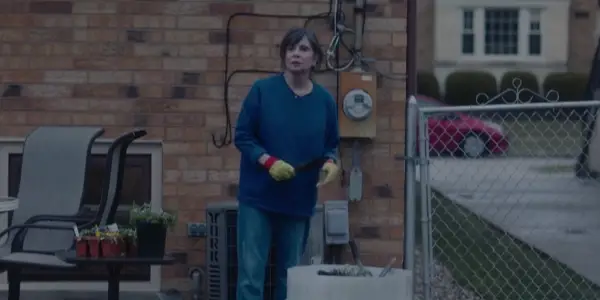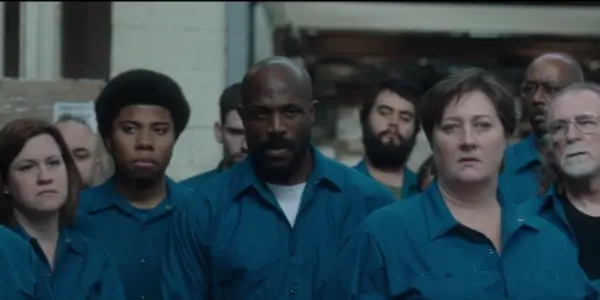WORKING MAN: A Sincere Tribute to Blue Collar America

Lana Stanczak is a student at Columbia College Chicago, majoring…
When the plant Allery Parkes has worked at for years shuts its doors, he has a strange reaction. Rather than look for a new job, he gets ready like he does every day and continues to work in the factory. Even if no one else is there.
Written and directed by Robert Jury in his feature debut, Working Man features quietly great performances and commentary on the modern industry worker, albeit a basic script.
Subtle Performances
Peter Gerety (Ray Donovan) leads the film as Allery, and does so with a quiet resilience. He accidentally begins a movement with his refusal to stop working as more and more of his co-workers and neighbors start to want in. Without saying much at times, Gerety is able to capture so much of the grief and disorientation Allery is going through. We get a sense of his character through his routine and short interactions with those around him. His silence makes the more verbal, emotional moments near the end pay off even more.

Talia Shire (The Godfather, Rocky) plays Allery’s wife, Iola. Though Shire does a good job balancing the love and frustration Iola feels, her character isn’t given much to do. She is the typical concerned but ignored wife. She comments that Allery is a different person than he was when they were first married, but we never get a sense of who that person was. Nevertheless, Shire brings even more humanity to an already grounded story.
Billy Brown (How To Get Away With Murder) plays Walter, Allery’s new neighbor who also lost his job at the factory. He pushes Allery to take the idea of continuing to work further, propelling it into a reverse picket-line of sorts. Walter has the most range of emotions to work with, and Brown pulls it off well, even when he is given dialogue like, “These machines are for use, not for shining up like some rich man’s show car.”
A Little Muddled
Much like last year’s Academy Award -winning documentary American Factory, Working Man is meant to show the problems in today’s factory life. Sometimes, though, that message gets muddled. Near the end of the film, there is information revealed about a character that reads almost like a soap-opera. While the atmosphere itself remains grounded, the twist doesn’t seem earned. It takes the focus away from Allery, who is dealing with his son’s death.

The film’s script is sometimes noticeably basic. At one point, Shire sort of breaks down to a friend about Allery’s distance and says, “It was perfect. Now it’s like he forgot all the steps and I don’t know what move he’s gonna make next.” Luckily, the film is a quiet one, relying on its great performers to get emotions like this across without speaking. That aspect of the film works so well, that it is a shame when lines like that pop up.
A Tribute to Blue Collar Workers
The reason why Working Man works as well as it does is the clear sincerity Jury made this film with. Filmed in Chicago over just 20 days, we feel the midwest, middle-class experience just as much as the characters do. Jury takes the time to show us what life is like for these workers. They seem like real people you might encounter in your own neighborhood.
That is partially illustrated by the excellent work of ensemble actors like J. Salome Martinez. Although we don’t get complex backstories for most of the side characters, we get the sense that they are a family. They are all bound together by their job and the work they do. There’s a fun rapport between them that keeps the film lively.
Most importantly, the minimalism of Working Man highlights a way-of-life that seems to be dying, through no one’s fault but the corporations. By seeing the way Allery and Iola live, audience members get insight into real working class Americans they might not know are out there.
Working Man: Conclusion
Despite the minimal script, Working Man is a well-made film with an important topic. Since most of us are cooped up at home, it is worth seeking this film out on VOD release.
What did you think of Working Man? Let us know in the comments!
Watch Working Man
Does content like this matter to you?
Become a Member and support film journalism. Unlock access to all of Film Inquiry`s great articles. Join a community of like-minded readers who are passionate about cinema - get access to our private members Network, give back to independent filmmakers, and more.
Lana Stanczak is a student at Columbia College Chicago, majoring in Creative Writing with a concentration in non-fiction. Her taste in film is very diverse, and some of her favorites include Singin' In The Rain, Ex Machina, Heathers, and Ghostbusters.













